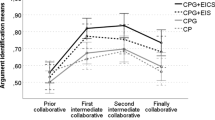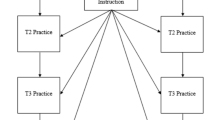Abstract
Writing argumentative syntheses based on multiple sources implies integrating ideas from different, often conflicting, positions. This can promote more constructive learning, especially when students undertake the task together with their peers. However, despite the importance of this activity in the university context, students generally lack the competency required. Thus, the primary objective of this research is to analyse the impact of a specific intervention programme (CPG + EICS) that combines help designed to foment collaboration with help aimed at improving the writing of argumentative syntheses, improving the quality of the university students’ work, whether undertaken individually or collaboratively. For this we designed an experimental study with one hundred and sixty participating psychology students, distributed randomly into four different intervention programmes. We then compared and contrasted the impact of the already mentioned first programme (CPG + EICS) with that of the three others in which we progressively reduced the help provided (explicit instruction with video modelling, a guide and collaborative practice). We evaluated the quality of the syntheses by examining the number of arguments and their degree of integration within the students’ texts. The results demonstrate that, to achieve the appropriate competency level, the intervention should include explicit instruction with video modelling. When this instruction combines help aimed at improving the elaboration of argumentative syntheses with help designed to foment collaboration, students integrate a higher level of contradictory information. However, to identify a high level of arguments, explicit instruction focused solely on helping students write argumentative syntheses turns out to be as effective as help directed at collaboration. In addition, after the intervention encouraging collaborative work, students successfully transfer the skills developed to their own individual writing tasks.
Similar content being viewed by others
References
Bañales, G., & Vega, N. A. (2016). La enseñanza estratégica de la argumentación escrita en las disciplinas: desafíos para los docentes universitarios [Strategic teaching of the argumentation written in the disciplines: challenges for university teachers]. In G. Bañales, M. Castelló, & N. A. Vega (Eds.), Enseñar a leer y escribir en la educación superior. Propuestas educativas basadas en la investigación [Teaching to read and write in higher education. Educational proposals based on research]. Ediciones SM: Ciudad de México, México.
Barron, B. (2003). When smart groups fail. The Journal of the Learning Sciences, 12, 307–359.
Cohen, E. G. (1994). Reestructuring the classroom: Conditions for productive small groups. Review of Educational Research, 64, 1–35.
Cuevas, I., Mateos, M., Martín, E., Luna, M., Martín, A., Solari, M., et al. (2016). Collaborative writing of argumentative syntheses from multiple sources: The role of writing beliefs and strategies in addressing controversy. Journal of Writing research, 8, 205–226.
Dale, H. (1994). Collaborative writing interactions in one ninth-grade classroom. Journal of Educational Research, 87, 334–344.
Dillenbourg, P. (2002). Over-scripting CSCL: The risks of blending collaborative learning with instructional design. In P. A. Kirschner (Ed.), Three worlds of CSCL. Can we support CSCL? (pp. 61–91). Heerlen: Open Universiteit Nederland.
Ferretti, R. P., & Lewis, W. E. (2013). Best practices in teaching argumentative writing. In S. Graham, C. A. MacArthur, & J. Fitzgerald (Eds.), Best practices in writing instruction (pp. 113–140). New York, NY: The Gilford Press.
Johnson, D., & Johnson, R. (2009). Energizing learning: The instructional power of conflict. Educational Researcher, 38, 37–51.
Johnson, D. W., & Johnson, R. (1992). Positive interdependence: Key to effective cooperation. In R. Hertz-Lazarowitz & N. Miller (Eds.), Interaction in cooperative groups (pp. 174–199). Cambridge, MA: Cambridge University Press.
Johnson, D. W., & Johnson, R. T. (2003). Controversy and creativity. In D. W. Johnson & R. T. Johnson (Eds.), Joining together. Group theory and group skills (pp. 319–365). Upper Saddle River, NJ: Pearson Education.
Kimmerle, J., Moskaliuk, J., Brendle, D., & Cress, U. (2017). All in good time: Knowledge introduction, restructuring, and development of shared opinions as different stages in collaborative writing. International Journal of Computer-Supported Collaborative Learning, 12, 195–213.
King, A. (2002). Structuring peer interaction to promote high level cognitive processing. Theory into Practice, 41, 33–39.
Klein, P. D. (1999). Reopening inquiry into cognitive processes in writing-to-learn. Educational Psychology Review, 11, 203–270.
Klein, P. D. (2014). Knowledge construction in collaborative science writing: Strategic simplicity, distributed complexity and explanatory sophistication. In P. D. Klein, P. Boscolo, L. Kirkpatrick, & C. Gelati (Eds.), Writing as a learning activity (pp. 300–327). Leiden: Brill.
Klein, P. D., & Leacock, T. L. (2012). Distributed cognition as a framework for understanding writing. In V. W. Berninger (Ed.), Past, present, and future contributions of cognitive writing research to cognitive psychology (pp. 133–152). New York, NY: Psychology Press.
Kuhn, D., Hemberger, L., & Khait, V. (2016). Dialogic argumentation as a bridge to argumentative thinking and writing. Infancia y Aprendizaje, 39, 25–48.
Marttunen, M., & Laurinen, L. (2012). Participant profiles during collaborative writing. Journal of Writing Research, 4, 53–79.
Mateos, M., Cuevas, I., Martín, E., Martín, A., Echeita, G., & Luna, M. (2011). Reading to write an argumentation: the role of epistemological, reading and writing beliefs. Journal of Research in Reading, 34, 281–297.
Mateos, M., Solé, I., Martín, E., Cuevas, I., Miras, M., & Castells, N. (2014). Writing a Synthesis from Multiple Sources as a Learning Activity. In P. Klein, P. Boscolo, L. Kirkpatrick, & C. Gelati (Eds.), Writing as a Learning Activity (pp. 168–190). Leiden, The Netherlands: Brill.
Mateos, M., Martín, E., Cuevas, I., Villalón, R., Martínez, I., & González-Lamas, J. (2018). Improving written argumentative synthesis by teaching the integration of conflicting information from multiple sources. Cognition and Instruction, 36, 119–138.
Mauri, T., Colomina, R., Clará, M., & Ginesta, A. (2011). Ayudas al aprendizaje en tareas de escritura colaborativa con Moodle [Learning aids in collaborative writing tasks with Moodle]. Electronic Journal of Research in Educational Psychology, 9, 1103–1128.
McAllister, C. (2005). Collaborative writing groups in the college classroom. In T. Kostouli (Ed.), Writing in context(s): Textual practices and learning processes in sociocultural settings (pp. 207–227). New York, NY: Springer.
Millian, M. (2005). Contextual factors enhancing cognitive and metacognitive activity during the process of collaborative writing. In G. Rijlaarsdam, H. Bergh, & M. Couzijn (Eds.), Effective learning and teaching of writing. A handbook of writing in education (pp. 59–76). New York, NY: Kluwer Academic Publishers.
Nokes-Malach, T. J., Richey, E., & Gadgil, S. (2015). When is it better to learn together? Insights from research on collaborative learning. Educational Psychology Review, 27, 645–656.
Nussbaum, E. (2008a). Using argumentation vee diagrams (AVDs) for promoting argument-counterargument integration in reflective writing. Journal of Educational Psychology, 100, 549–565.
Nussbaum, E. (2008b). Collaborative discourse, argumentation, and learning: Preface and literature review. Contemporary Educational Psychology, 33, 345–359.
Nussbaum, E. M., & Schraw, G. (2007). Promoting argument–counterargument integration in students’ writing. Journal of Experimental Education, 76, 59–92.
Nykopp, N., Marttunen, M., & Laurinen, L. (2014). University students’ knowledge construction during face to face collaborative writing. In P. Klein, P. Boscolo, L. Kirkpatrick, & C. Gelati (Eds.), Writing as a learning activity (pp. 277–299). Leiden: Brill.
Onrubia, J., & Engel, A. (2009). Strategies for collaborative writing and phases of knowledge construction in CSCL environments. Computers & Education, 53, 1256–1265.
Perin, D. (2013). Literacy skills among academically underprepared students. Community College Review, 41, 118–136.
Prichard, J., Bizo, L., & Stratford, R. (2006). The educational impact of team-skills training: Preparing students to work in groups. British Journal of Educational Psychology, 76, 119–140.
Reznitskaya, A., Anderson, R. C., & Kuo, L. (2007). Teaching and learning argumentation. The Elementary School Journal, 107, 449–472.
Rouet, J., Britt, A., Mason, R. A., & Perfetti, C. A. (1996). Using multiple sources of evidence to reason about history. Journal of Educational Psychology, 88, 478–493.
Scheuer, O., McLaren, B. M., Weinberger, A., & Niebuhr, S. (2014). Promoting critical, elaborative discussions through a collaboration script and argument diagrams. Instructional Science: An International Journal of the Learning Sciences, 42, 127–157.
Segev-Miller, R. (2004). Writing from sources: The effect of explicit instruction on college students’ processes and products. L1-Educational Studies in Language and Literature, 4, 5–33.
Segev-Miller, R. (2007). Cognitive processes in discourse synthesis: the case of intertextual processing strategies. In G. Rijlaarsdam (Series Ed.), M. Torrance, L. van Waes, & D. Galbraith (Vol. Eds.), Studies in writing: Vol. 20: Writing and cognition: Research and applications. (pp. 231–250). Amsterdam: Elsevier.
Shehadeh, A. (2011). Effects and student perceptions of collaborative writing in L2. Journal of Second Language Writing, 20, 286–305.
Spivey, N. N. (1997). Reading, writing and the making of meaning. The constructivist metaphor. San Diego, CA: Academic Press.
Storch, N. (2005). Collaborative writing: Product, process and students’ reflections. Journal of Second Language Writing, 14, 153–173.
Sturm, A. (2016). Observing writing processes of struggling adult writers with collaborative writing. Journal of Writing Research, 8, 301–344.
Thomas, T. A. (2014). Developing team skills through a collaborative writing assignment. Assessment & Evaluation in Higher Education, 39, 479–495.
Tynjälä, P. (2001). Writing, learning and the development of expertise in higher education. In P. Tynjäla, L. Mason, & K. Lonka (Eds.), Writing as a learning tool. Integrating theory and practice (pp. 37–56). Dordrecht: Kluwer Academic Publishers.
Van Steendam, E. (2016). Editorial: Forms of collaboration in writing. Journal of Writing Research, 8, 183–204.
Van Steendam, E., Rijlaarsdam, G., Van den Bergh, H., & Sercu, L. (2014). The mediating effect of instruction on pair composition in L2 revision and writing. Instructional Science, 42, 905–927.
Vauras, M., Iiskala, T., Kajamies, A., Kinnunen, R., & Lehtinen, E. (2003). Shared-regulation and motivation of collaborating peers: A case analysis. Psychologia, 46, 19–33.
Volet, S., Summers, M., & Thurman, J. (2009). High-level co-regulation in collaborative learning: How does it emerge and how is it sustained? Learning and Instruction, 19, 128–143.
Wigglesworth, G., & Storch, N. (2012). What role for collaboration in writing and writing feedback. Journal of Second Language Writing, 21, 364–374.
Wiley, J., Steffens, B., Britt, M. A., & Griffin, T. D. (2014). Writing to learn from multiple-source inquiry activities in history. In P. D. Klein, P. Boscolo, L. C. Kirpatrick, & C. Gelati (Eds.), Studies in writing: Vol. 28, writing as a learning activity (pp. 120–148). Leiden: Brill.
Yeh, H. C. (2014). Exploring how collaborative dialogues facilitate synchronous collaborative writing. Language Learning & Technology, 18(1), 23–37.
Funding
This study was funded through a grant from the Formación de Personal Investigador del Ministerio de Economía y Competitividad (BES-2014-068830) programme and by the Proyecto de investigación (EDU2013-46606-C2-1-R) granted within the framework of the Programa Estatal de I + D+i oriented towards the Retos de la Sociedad del Ministerio de Economía y Competitividad (Spain).
Author information
Authors and Affiliations
Corresponding author
Additional information
Publisher's Note
Springer Nature remains neutral with regard to jurisdictional claims in published maps and institutional affiliations.
Rights and permissions
About this article
Cite this article
Granado-Peinado, M., Mateos, M., Martín, E. et al. Teaching to write collaborative argumentative syntheses in higher education. Read Writ 32, 2037–2058 (2019). https://doi.org/10.1007/s11145-019-09939-6
Published:
Issue Date:
DOI: https://doi.org/10.1007/s11145-019-09939-6




